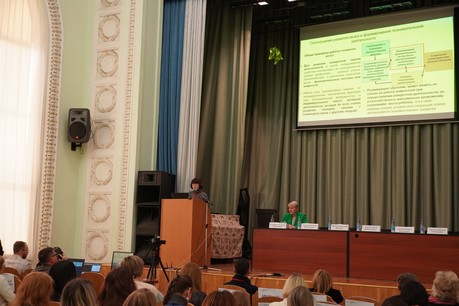Unveiling Link Between Consistent Sleep Patterns and Academic Success in High School Students
On December 7-9, the 6th International Cognitive Neuroscience Forum Cognitive Neuroscience – 2023 takes place at the Ural Federal University. Participants of the forum discussed how children’s brains develop and how learning takes place, what mechanisms in the brain are responsible for long-term memory, what is the phenomenon of insight and how it comes about, and many other things.
For example, Regina Machinskaya, head of the Laboratory of Neurophysiology of Cognitive Activity of the Institute of Physiology of Aging of the Russian Academy of Sciences, reported on the possibilities and limits of brain development and learning in children. In particular, according to the expert, the key point for the favorable development of cognitive processes in children is social interaction between a child and an adult.
“It is known that practically a newborn baby can distinguish the pattern of a face that is looking at it from other facial patterns. In other words, we can probably say that in humans the need for social interaction is a species trait,” explains Regina Machinskaya.
From the moment of development until about two years of age, there is an intensive formation of brain mechanisms that ensure the perception of socially significant information and interaction with an adult, adds the psychologist.
The older preschool age is also important, says the expert. During this period, changes occur in the neural organization of the frontal and posterior associative cortex and the connections of these structures with other brain structures. Thus, according to the expert, approximately in the period from 5 to 8 years, the volume of nerve cells decreases, and the proportion of structures connecting neurons – neuronal endings, dendrites – increases.
In the VK group of the Ural Institute of Humanities, you can find this and other presentations of speakers.
The main directions of the Forum are neuroeducation and cognitive aspects of learning, biological aspects of cognitive health, psychological well-being in the conditions of digital transformation, cognitive aspects of aging, and others. In the thematic sections and workshops, specialists will also talk about the latest research in neuropsychology, psychogenetics, cognitive development, psycholinguistics, and neurotechnology. Visitors to the exhibition will be able to see neurophysiological equipment and programs for assessing a person’s cognitive and emotional state, which will be presented by specialists from the Ministry of the Russian Federation for Civil Defence, Emergencies and Elimination of Consequences of Natural Disasters, the Neurotechnology Laboratory of the Ural Federal University, and the Neuroiconics Assistive Company.

